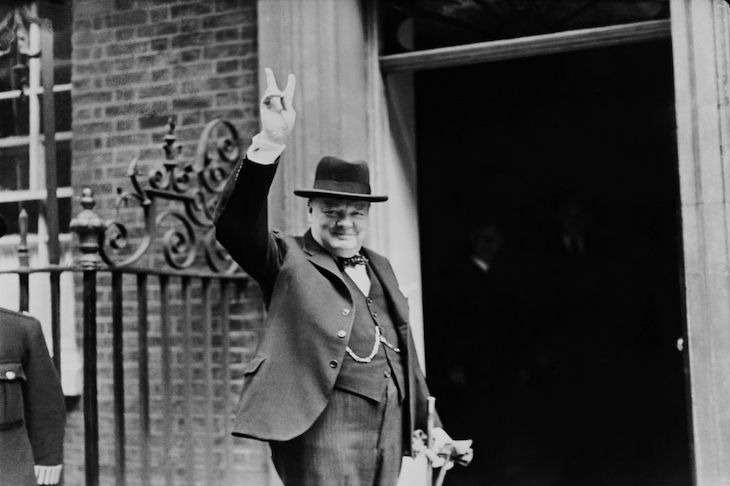The concerted attempt by left-wing figures to smear Winston Churchill last week is no surprise. In fact, it is another instance of a phenomenon I identified on these pages last November when I wrote about the cultural appropriation of the first world war.
That process began in the early 1960s, with the myth of ‘Lions led by Donkeys’, but the liberal intelligentsia soon began to broaden their cultural appropriation of British history by impugning the reputation of its great men.
In September 1967 the Sunday Times published an article by Len Deighton in which he accused David Stirling, the founder of the SAS, of imperilling the lives of his men during operations in the second world war through careless talk at cocktail parties. Stirling won substantial damages in his libel action and in a subsequent statement to the SAS Regimental journal he accused Deighton of ‘debased prejudices’ and lamented a culture ‘hell bent on eroding away the remaining vestiges of our country’s basic moral discipline and principles by snide mockery of traditional institutions and the people honourably serving them.’
That snideness has only increased in recent decades with a plethora of unsubstantiated allegations about the private lives of such figures as Lawrence of Arabia, Bernard Montgomery, Lord Baden-Powell, Lord Kitchener and Gordon of Khartoum.
These spurious claims often commit the cardinal historical error of judging the past by the present; of wrenching history out of its cultural context to draw dubious or erroneous conclusions.
This is the folly of which Churchill’s critics are guilty. He had his flaws and made mistakes but to accuse him of villainy and war crimes, such as John McDonnell and Owen Jones have, is simplistic and ignorant.
Jones has previous in this respect. In 2016 the Guardian columnist wondered if statues of Queen Victoria might be offensive, while the same newspaper also gave space to the broadcaster Afua Hirsch so that she could demand the removal of Nelson from his column because he was a ‘white supremacist’.
The use of such emotive words only incites others to more extreme measures, whether they be students painting over a Rudyard Kipling mural, or thugs in central London vandalising monuments honouring Churchill, Bomber Command and the Royal Marines.
There is another strategy to the left’s cultural appropriation of Britain’s history: replacing figures whose faces no longer fit the Zeitgeist with those they think do.
Take Alan Turing, who this month was named by the BBC as the ‘Greatest Person of the 20th Century.’ According to which source you read, Turing’s breaking of German codes shortened the war by two, four, or, in the opinion of the Imperial War Museum, ‘several years’. These are figures plucked out of thin air with no evidence to back them up.
Turing was a brilliant code-breaker, but his role in recent years has been blown out of all proportion to the detriment of his colleagues at Bletchley Park, and particularly the members of Poland’s Cipher Bureau, who began decrypting German Enigma codes in the 1930s.
Furthermore, the importance of the intelligence decoded from the Germans (known as ‘Ultra’) was not as significant as has been portrayed. In North Africa, as in the European theatre later in the war, most Enigma messages were not decoded quickly enough to influence the decisions of battlefield commanders. In the words of Sir Max Hastings, Ultra was ‘an important weapon but it was not a magic sword’.
Likewise, the war in the Atlantic against German U-Boats was won because of a variety of factors – notably improved radar technology and air support for Allied convoys. In his book, The Battle of the Atlantic, Jonathan Dimbleby was enlightened by Tony Comer, the departmental historian at GCHQ, the modern-day Bletchley Park, who made the historian understand ‘that Ultra made a far smaller contribution to the outcome of the Battle of the Atlantic than is widely supposed.’
None of which has put a brake on the beatification of Turing. In recent years he has been honoured with a statue, a stamp, a film, a play, a college, a ring road, a song and he is on the shortlist to be the face of the new £50 note. All this for a talented mathematician who broke some codes.
The real reason Turing was named the Greatest Person of the 20th Century isn’t because of what he achieved in life but for the manner of his death. Prosecuted in 1952 for homosexual acts – ‘gross indecency’, to use the awful jargon of the decade – Turing chose chemical castration rather than a prison sentence. Two years later he took his own life.
It was a shameful moment in Britain’s history and it is only right that the inhumane treatment meted out to Turing and other men criminalised for their sexuality has been acknowledged. But what was the point of Gordon Brown’s prime ministerial apology in 2009, and the Queen’s Pardon four years later?
They were facile contributions to the Cult of Victimhood that dominates 21st century Britain. This also explains why Turing’s war-time accomplishments have been lavishly exaggerated: we live in an age where one’s virtuousness is measured by one’s suffering, and Turing suffered for his sexuality.
The cultural appropriation of Britain’s history has been going on for half a century and it’s time the revisionists were repulsed. In the words of Churchill, ‘let us go forward together with our united strength’.







Comments